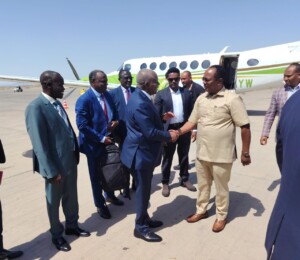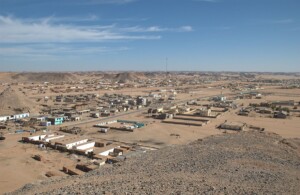State of Emergency declared in Sudan – President Al Bashir dissolves govt
President Omar Al Bashir has declared a State of Emergency in Sudan, and dissolved the federal government and state governments. The State of Emergency will be in force of a year.
 Sudan's President Omar Al Bashir (SUNA)
Sudan's President Omar Al Bashir (SUNA)
President Omar Al Bashir has declared a State of Emergency in Sudan, and dissolved the federal government and state governments. The State of Emergency will be in force of a year.
In six Republican Decrees issued on Friday night, Al Bashir dissolved the national Council of Ministers, assigned the Secretaries General and Undersecretaries of Ministries to run the work of their ministries, assigned a new ‘government of competencies’, relieved the Walis (governors) of the states, dissolved the governments of the states, and appointed high-ranking police and military officers as the new Walis of the states.
In a speech at the Presidential Palace on Friday, Al Bashir also announced the suspension of the constitutional amendment procedures, which would allow him to run for a new term, stressing to make the National Dialogue document the basis for dialogue with all political forces.
Al Bashir’s announcements come in the wake of an ongoing popular uprising in Sudan that has continued unabated since mid-December 2018. Demonstrations have been met by violence from government forces, dozens of demonstrators and activists have been killed, hundreds wounded, and countless people have been detained , tortured, and assaulted.
Opposition forces
The Sudanese Professionals Association and the forces signatory to the Declaration of Freedom and Change – major movers behind the popular uprising and protests – confirmed their unwavering commitment to the unconditional step-down of Al Bashir and his regime, the dismantling of repressive institutions, and the handover of power to a transitional civilian national government.
They vowed to continue peaceful resistance, considering what happened as “an attempt to circumvent the demands of the Sudanese people,” stressing that “the demands of the revolution are clear and cannot be jumped on”.
They called on all Sudanese people to go out to the street, asserting that “the regime is at its hour of collapse”.
Hundreds of people went out before and after Al Bashir's speech in the districts of Khartoum in demonstrations raging against Al Bashir's decisions.
New Ministers (Source: SUNA):
- Mohamed Tahir Eila as the Prime Minister
- Dr Fadul Abdallah Fadul as the Minister of the Presidency of the Republic
- Hamid Mumtaz as the Minister of the Federal Government Bureau
- Ahmed Saad Omar as the Minister of the Cabinet Affairs
- Lt Gen Awad Ibn Auf as the Minister of Defence
- Dr El Dirdeiri Mohamed Ahmed as the Minister of Foreign Affairs
- Mohamed Ahmed Salim as the Minister of Justice
New Walis (governors) (Source: SUNA):
- Lt Gen (police) Hashim Osman El Hussein as the Wali of Khartoum
- Lt Gen El Mohamed Salim as the Wali of El Gezira
- Maj Gen (Rtd.) El Tayeb El Musbah as the Wali of Rive Nile state
- Lt Gen Ali Mohamed Gerenat as the Wali of Kassala
- Maj Gen El Mardi Siddig as the Wali of North Kordofan
- Maj Gen Mustafa Nour as the Wali of the Red Sea state
- Lt Gen Ahmed Khamis Bakhit as the Wali of the White Nile state
- Maj Gen Eisa Abdallah Idris as the Wali of Sennar
- Lt Gen Yahya Mohamed Kheir as the Wali of the Blue Nile state
- Lt Gen Hashim Abdelmutalab as the Wali of the Northern State
- Maj Gen (Rtd) El Naeem Khidir Mursal as the Wali of North Darfur
- Lt Gen Ahmed Abushanab as the Wali of South Darfur
- Lt Gen Mohamed Manti Anjar as the Wali of South Kordofan
- Maj Gen Khalid Nour El Dayem as the Wali of Central Darfur
- Lt Gen (security) Dukhrelzaman Omar as the Wali of Central Darfur
- Brig Gen (security) Mubarak Shamat as the Wali of El Gedaref
- Maj Gen Muhalab Hasan Ahmed as the Wali of West Darfur
- Maj Gen Suleiman Mukhtar as the Wali of East Darfur











 and then
and then